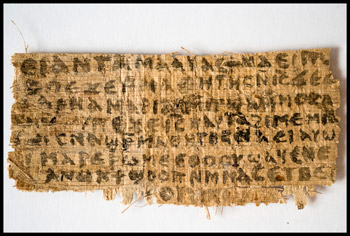
A newly revealed piece of papyrus offers evidence that some early Christians believed Jesus was married, according to a Harvard Divinity School professor.
A fourth-century codex in Coptic quotes Jesus referring to "my wife," Karen King, a scholar of early Christianity, said on Tuesday. It is the only extant text in which Jesus is explicitly portrayed as betrothed, according to King.
King is calling the receipt-sized slip of papyrus "The Gospel of Jesus' Wife." She believes it was originally written in Greek, and later translated into Coptic, an Egyptian language.
The fragment says, "Jesus said to them, 'My wife...,'" according to King. The rest of the sentence is cut off. Another segment says, "As for me, I dwell with her in order to..." The speaker is not named.
The fragment contains just 33 words spread across 14 incomplete lines—less a full-fledged gospel than an ancient crossword puzzle.
"Christian tradition has long held that Jesus was not married, even though no reliable historical evidence exists to support that claim," King said in a statement released Tuesday by Harvard. "This new gospel doesn't prove that Jesus was married, but it tells us that the whole question only came up as part of vociferous debates about sexuality and marriage."
Tuesday's surprise announcement seemed ripped from the pages of Dan Brown's 2003 novel, The Da Vinci Code, which sold millions of copies—and irked the Vatican—by suggesting that Catholic leaders had covered up Jesus' marriage to Mary Magdalene. King said that she does not believe that Jesus was married to Mary Magdalene. "At least, don't say this proves Dan Brown was right," she told The New York Times.
But in another novelistic twist, King presented her research on Tuesday in the Vatican's front yard, at a Coptic Studies conference held at the Catholic Church's Institutum Patristicum Augustinianum in Rome.
The Vatican has not yet responded to her research, King said at a news conference on Tuesday.
King acknowledged in her research paper that "nothing is known about the circumstances of its original discovery or early ownership." The earliest clue about the fragment's history is a letter from the 1980s hinting that a German Egyptologist believed that it offered evidence that Jesus might have been married, according to King.
An anonymous collector brought the yellowed and tattered fragment to King, a respected historian of early Christianity, and asked her to help analyze and translate it in 2010.
"I didn't believe it was authentic and told him I wasn't interested," King said. After cajoling, however, King relented and agreed to have the fragmented examined by scholars.
Upon examination, a papyrologist, a scholar of early Christianity at Princeton University and a Coptic expert at Hebrew University in Jerusalem all consider it likely to be authentic, according to King.
"On the basis of the age of the papyrus, the placement and absorption of the ink on the page, the type of the handwriting, and the Coptic grammar and spelling, it was concluded that it is highly probable that the fragment is an ancient text," King writes in her research paper.
King said further tests will be made on the chemical composition of the ink. King's research paper will be published in the January 2013 issue of Harvard Theological Review, a peer-reviewed journal.



